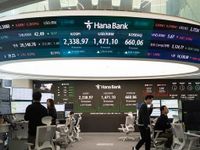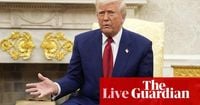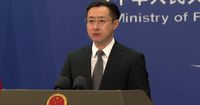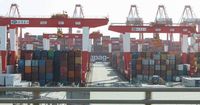China has declared it will "fight to the end" in response to President Donald Trump's recent threats to impose an additional 50% tariff on Chinese imports, escalating tensions between the two economic giants. The announcement came on Tuesday, April 8, 2025, as the U.S. President warned that if China did not retract its retaliatory tariffs of 34% on U.S. goods by the end of the day, the new tariffs would take effect on April 9.
In a statement, China's Ministry of Commerce condemned the U.S. actions as "completely groundless" and labeled them a form of unilateral bullying. The ministry emphasized that the countermeasures China has taken are aimed at protecting its sovereignty and maintaining a stable international trade order. "The U.S. threat to escalate tariffs on China is a mistake on top of a mistake, once again exposing the blackmailing nature of the U.S. China will never accept this," the ministry stated. It further warned that if the U.S. insisted on its course, China would respond with full force.
Trump's latest tariff threat follows a series of retaliatory measures from both nations, raising concerns among analysts and traders about the potential for a full-blown trade war. The looming tariffs could push U.S. tariffs on Chinese goods to an unprecedented 104%, significantly increasing costs for American consumers and businesses.
On Truth Social, Trump expressed his frustration with China, stating, "If China does not withdraw its 34% increase above their already long-term trading abuses by tomorrow, April 8th, 2025, the United States will impose ADDITIONAL Tariffs on China of 50%, effective April 9th." He also announced that all talks with China regarding their requested meetings would be terminated, signaling a hardline stance in negotiations.
The escalating conflict has sent shockwaves through global markets. Following Trump's announcement, stock markets from Tokyo to New York have experienced heightened volatility, with fears of a trade war leading to significant fluctuations. On April 8, reports indicated that the S&P 500 index and the Dow Jones Industrial Average were set to open up by between 1% and 2%, reflecting a tentative recovery after days of declines.
In Beijing, citizens expressed mixed feelings about the situation. Wu Qi, a construction worker, commented, "Trump says one thing today and another tomorrow. Anyway, he just wants benefits, so he can say whatever he wants." Meanwhile, others like Paul Wang, who sells stainless accessories to Europe, noted the European market's growing importance as they brace for the impact of the new tariffs.
China's response could include a range of retaliatory measures, such as suspending cooperation on combating fentanyl trafficking, imposing higher quotas on agricultural products, or targeting U.S. services in China, such as finance and law firms. Experts emphasize that China has several avenues to strike back, yet the political ramifications of appearing weak could deter Beijing from making concessions.
Lin Jian, a spokesperson for China's Foreign Ministry, dismissed the notion of dialogue with the Trump administration, stating, "I don’t think what the U.S. has done reflects a willingness for sincere dialogue. If the U.S. really wants to engage in dialogue, it should adopt an attitude of equality, mutual respect, and mutual benefit." This sentiment reflects a broader frustration in China over perceived U.S. bullying tactics.
In Hong Kong, Chief Executive John Lee criticized the U.S. tariffs as "bullying," asserting that they threaten global trade and create uncertainty. He pledged to strengthen ties with China, sign more free trade agreements, and support local enterprises in navigating the challenges posed by the tariffs.
As the situation unfolds, the European Union is also weighing its options. European Commission President Ursula von der Leyen has called for a negotiated solution and emphasized the importance of a fair trading system. The EU has proposed counter-tariffs of 25% on selected U.S. goods, aiming to respond to Trump's aggressive tariff policies while minimizing harm to its own consumers.
In light of these developments, analysts at Citi have revised their 2025 GDP growth forecast for China down to 4.2%, citing rising external risks stemming from the trade conflict. The potential for a global recession looms as markets react to the uncertainty surrounding U.S.-China relations.
As of now, Trump's administration appears resolute in its approach, with Treasury Secretary Scott Bessent indicating that negotiations are ongoing with other countries as the U.S. seeks to redefine its trade relationships. However, the looming tariffs and retaliatory measures from China may lead to a prolonged standoff, with implications that could ripple across the global economy.
In summary, the current state of U.S.-China trade relations is fraught with tension, as both nations prepare for a potential escalation that could reshape the global economic landscape. With Trump's tariffs set to take effect imminently, the world watches closely to see how both sides will navigate this precarious situation.









